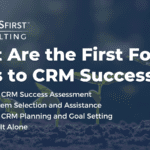How Poor Data Can Undermine Your CRM Strategy

In the world of information management, the age-old phrase “garbage in, garbage out” resonates deeply. While technology has evolved, bringing in sophisticated systems and tools, the challenge of flawed data management persists.
Understanding the Issue: With the plethora of technology tools available today, one might think the problem of bad data would be obsolete. Despite tools like Google, LinkedIn and advanced CRM systems, poor data quality is an ongoing struggle. The rapid pace of changes in personal and business information means that even once accurate data can quickly become obsolete.
The Impact of Poor Data: Inaccurate data can provide a distorted view of business performance. Relying on flawed data can lead to misguided strategies, impacting overall business performance. Moreover, a CRM system filled with “garbage” data can hinder its adoption.
People: The Core of the Problem: Technological tools, no matter how advanced, rely on human input. The constant maintenance of data is imperative for achieving accurate outputs. A lack of regular maintenance can turn investments in CRM systems into non-performing assets.
Effective Data Management Steps:
- Assess the Mess: Before taking action, understanding the extent of the problem is essential.
- Strategize: After understanding the problems, formulate a plan to address them efficiently.
- Prioritize: Focus on the most critical data first, such as primary clients or prospects.
- Dedicate Resources: Invest in trained professionals who understand CRM and data cleansing to maintain data quality.
- Sanitize: Regularly clean up data by addressing issues like duplicate records, missing information and bounced emails.
- Repeat: Recognize that data management is an ongoing process. With the constant change in information, regular upkeep is imperative.
Conclusion: Ensuring data quality is crucial for leveraging the benefits of CRM systems. While the journey may seem daunting, with a structured approach, maintaining quality becomes feasible.
Key Takeaways
- Flawed data can distort business insights and hinder CRM adoption.
- Continuous and regular maintenance is pivotal for CRM data quality.
- The process of maintaining data quality involves assessing, strategizing, prioritizing, dedicating resources, sanitizing and repeating.
- Dedicated resources and a structured approach are keys to effective data management.
For more than a decade, the team at CLIENTSFirst Consulting has been helping professional services firms and other organizations successfully select and implement CRM and eMarketing systems and improve Data quality to maximize value, adoption and return on investment. If you need help achieving CRM Success, please contact us at 404-249-9914 or Info@ClientsFirstConsulting.com.






